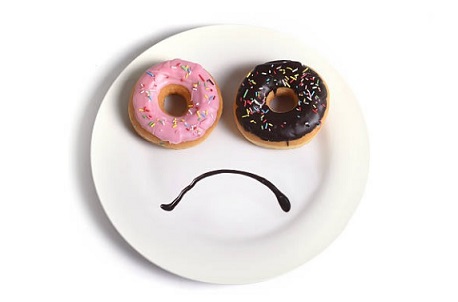

The feeling of hunger, often associated with an empty stomach, is actually caused by something completely different than the lack of food in the stomach. Hunger does not arise in the belly. This unpleasant feeling arises in our heads and is related to the low level of sugar in our bodies. This happens when the brain gets used to the easily digestible, but short-term source of energy, which are carbohydrates and various types of sugar. Our brain quickly becomes dependent on a constant supply of “easy” energy and demands more meals, which most people equate with hunger. Paradoxically, eating carbohydrates does not satisfy hunger, on the contrary, it makes you hungry!

Do you know what is the most addictive substance in the world? It is not any drug, tobacco, or alcohol, it is sugar. Available in any store, it is not only the most harmful ingredient of many people’s food but also the most addictive one. In an experiment conducted on rats, scientists gave rodents free access to cocaine and sugar so that they could become addicted to both substances. They then programmed a cocaine and sugar dispenser so that the rats, after eating one substance, would lose the ability to consume another for 24 hours. If the rat tasted the sugar, the cocaine distributor was closed all day and vice versa. The effect of this experiment was that the rats stopped consuming cocaine in favour of constant access to sugar. Does it make you think?
How many times after a meal low in carbohydrates you did not feel full, and it was enough to eat a dessert or a piece of chocolate and the brain got what it wanted and the feeling of hunger disappeared?
Let us remind you that our body can operate on two types of “fuel”. They are glucose, the source of which are carbohydrates and sugar, and fat. Our body cannot store glucose, so it converts its excess into fat and stores it “later” in fat cells. It is only up to us when it is “later”. If we eat the (in) famous 5 meals a day of carbohydrates, our body will be able to store fat “for later” throughout the day. When sleep comes, the body shifts from taking energy in sugar to feeding on fat. This is the only reason why we do not wake up at night to “eat” food because nature can switch from one type of fuel to another during sleep. Sick people often experience a situation in which they wake up at night and the feeling of hunger (sugar addiction) is so strong that they have to eat something, preferably sweet, otherwise, they will not fall asleep … Most people, however, sleep all night and in the morning before eating anything, our the body is still breaking down triglycerides into fat molecules, which are then used to supply the body with energy.

What is the most common mistake leading to obesity and disease? Drinking a sweet drink right after waking up, tea or coffee with sugar or fruit juice, eating carbohydrates in the form of bread. A small amount of sugar or carbohydrates is enough for our body to stop decomposing triglycerides into fat particles (that is, to burn our fat tissue) and to start the reverse process, ie storing energy “for later”. It is very difficult to reverse the way you feed your body from glucose to fat during the day, precisely because you feel hungry and addicted to sugar. For this reason, it’s easiest to start following our ketogenic diet after a night of sleep when your body is in a fat-burning state.
The same well-known relationship works with eating carbohydrates and sugar as with sugary drinks. Drinking large amounts of such drinks does not satisfy your thirst, it only increases it. This is due to sugars. When you eat carbohydrates, digestive enzymes break down sugars and they end up in your bloodstream. Our cells absorb glucose and use it as fuel for the body.
The problem is that our body is not able to put off carbohydrates “for later”. When you eat a high-carbohydrate meal, it is digested very quickly and leaves the stomach. When the stomach is empty, the feeling of hunger returns very quickly. Fatigue and the feeling that you should eat again appear quickly. This is because glucose, which is turned into carbohydrates, can fuel the body for a very short time.
After an hour or two, even after eating a large meal, we feel “hungry”. Hence the misconception that you should eat 5 meals a day. It’s just that they do not meet the body’s needs, and only drown out the signals sent by the brain due to the lack of sugar. This is not all, because excess sugar is processed and stored by the body as fat.
Sugar does not activate any of the hormones, such as cholecystokinin or YY peptide, responsible for the feeling of satiety. It also does not activate receptors in the stomach that signal satiety. As a result – we eat a lot, overeat, often feel hungry and get fat.

The situation is even worse when we consider the effect that carbohydrate foods have on blood sugar levels. Your blood sugar rises very rapidly after you eat a carbohydrate-rich meal. Since high blood sugar can be dangerous to your health, the pancreas ejects insulin at an increased rate and blood levels increase. The glucose found there quickly enters the cells and its concentration drops sharply. Low blood glucose signals the brain that more of it is needed, so it initiates a feeling of hunger, which encourages eating, the circle closes, and unused glucose is turned into fat.
The answer is to switch to using fat as fuel for your body. Unlike sugars (carbohydrates), they can fuel your body all the time. Since it is available to the body without interruption because it is naturally stored by us – it allows the body to be constantly supplied with the necessary energy and nutrients. What’s more, getting energy from fat allows you to avoid the above-described hunger pangs caused by spikes in blood sugar. When changing habits, the feeling of hunger only occurs in the initial period, because the brain is used to obtaining energy from carbohydrates. We guarantee that this feeling passes over time, but there is a whole range of positive phenomena: increased energy, better well-being, natural weight loss, or improved mood.
Drink plenty of water with lemon and salt, and in emergencies, well-salted broth.
Prepare yourself a roll of ham, cheese, avocado, and butter or nuts.
Consume coconut oil in the morning (if you don’t have it, use butter) with coffee, tea, or just eat a tablespoon of coconut oil.
Get rid of all temptations from your home: fruit, sweets, flour, rice, potatoes, groats.
Avoid eating in the company of people who will eat forbidden things in front of you. Just thinking about sugar and carbohydrates, our brain signals the production of insulin, which only increases the feeling of hunger. If this happens just at the thought, imagine what will happen when you see and smell the forbidden products.
Try to broaden your knowledge (e.g. through our newsletter or articles available on the KetosisDietitian.com website) of why sugar and its derivatives and most carbohydrates are harmful – this will make it easier to come to terms with not eating them.
Check what “substitutes” to use for your favourite dishes – here you will find a list of products allowed on the ketogenic diet.
Realize what you really like about dishes with ingredients from our forbidden list. For example: what do you like about pizza? Bottom or toppings? What can you eat separately? The bottom itself? Or maybe the toppings? Isn’t the thought of eating a dry pizza dough unacceptable? How will you feel after eating such a portion of a dry bottom? Now imagine that you eat the toppings alone – is it better? So all you have to do is replace the pizza bottom with something from our replacement list. Spaghetti is another example – are you able to eat cooked pasta alone without any additives? Probably not, but everything you add to pasta can be eaten with good taste without it. Try to come up with more examples like this to better understand that the ingredients on the banned list are so-called clogs, without high nutritional value, but with high side effects in long-term consumption.
Receive tips, articles and all the goodies absolutely free, straight to your inbox!